On 4 to 6 September, the world’s public development banks will gather for the Finance in Common Summit in Cartagena, Colombia. They’ll be discussing key development issues – from climate change to infrastructure – issues that affect the lives of millions of people around the world. Bankwatch is on the ground to expose the adverse impacts of investments made by development banks and advocates for meaningful community participation in decision-making on development projects.
Bankwatch, Democratisation team | 4 September 2023
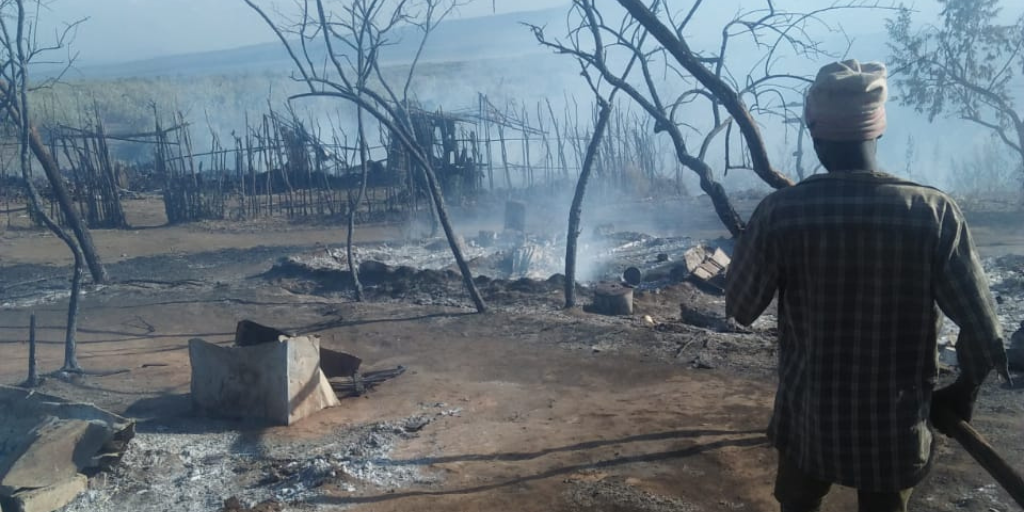
An informal settlement near Akiira 1 geothermal plant burnt down in 2019. Credit: Bankwatch
On 4 to 6 September, the world’s public development banks will gather for the Finance in Common Summit in Cartagena, Colombia. They’ll be discussing key development issues – from climate change to infrastructure – issues that affect the lives of millions of people around the world. Bankwatch is on the ground to expose the adverse impacts of investments made by development banks and advocates for meaningful community participation in decision-making on development projects.
Over recent years, Bankwatch has been monitoring cases of human rights violations and environmental damage connected with projects financed by development banks. Here are some of the worst offenders. You be the judge: Is this really development?
Corridor Vc Motorway, Bosnia and Herzegovina: A threat to the unique Neretva valley
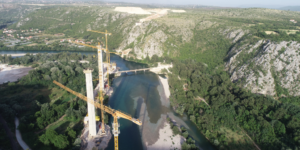
Currently under construction, the Corridor Vc motorway is expected to stretch 335 km through Bosnia and Herzegovina from north to south. The project is funded by loans from the European Bank for Reconstruction and Development (EBRD), the Western Balkans Investment Framework (WBIF) and the European Investment Bank (EIB). Some sections of the corridor, especially in southern BiH around Mostar, have long faced opposition from local communities. Many environmental and social impacts have been overlooked during the development and construction of the project. Critical habitats along the Buna, Bunica and Neretva rivers have been put at risk, and there has been no meaningful engagement with local communities throughout the entire spatial planning and route selection process. The potential risks to ethnic minorities and war returnees, including resettlement issues and negative impacts on their property and livelihoods, have also been ignored.
DFF Adriatic Metals mining project, Bosnia and Herzegovina: mining at all costs
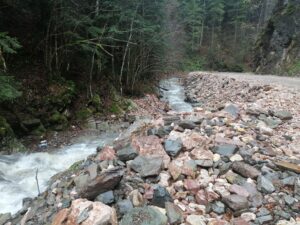
Financed by an EBRD loan, DFF Adriatic Metals is a mining project located between the towns of Vareš and Kakanj in BiH. While a small section of the project is situated on a brownfield site (previously used for mining), most of the works are being carried out on a new large greenfield area. This has had widespread environmental impacts on the surrounding forested areas and watercourses, with Kakanj residents raising concerns about the potential effects of the project on the town’s water supply. Furthermore, the access road to the mine has been built in a completely different location to the one initially examined in the EBRD’s environmental assessments. Additional studies reveal that the mine and its access roads will damage critical habitats, a potential risk that was not properly assessed or mitigated. Finally, the local community in Kakanj was not involved in contributing to decisions on the project design at any stage.
Tbilisi public transport reform, Georgia: between resolution and resistance

The EBRD and the Asian Development Bank (ADB) have been providing critical investments for the Tbilisi public transport sector since 2015. However, none of the planned reforms and infrastructure projects have been completed, nor do they fully comply with the goals of the public transport policy overhaul, such as giving priority to pedestrians, enhancing mobility opportunities for the city’s residents, and improving air quality in the capital.
Today, car ownership is still rising rapidly, congestion has worsened, and air quality continues to deteriorate – the average monthly concentration of PM2.5 in Tbilisi is four times higher than WHO’s annual threshold. Not only that, urban public transport is still overcrowded and unreliable. Other problems that need to be addressed are the widespread sexual harassment of women and discrimination against lesbian, gay, bisexual, transgender, and intersex (LGBTI) people, and a lack of proper accessibility for people with disabilities. Read our story on what can be done to resolve Tbilisi’s transport policy conundrums.
International North–South Transport Corridor, Georgia: culture and livelihoods under threat
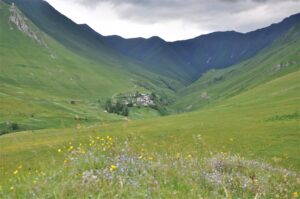
Backed by international financial institutions, including the EBRD and ADB, the International North–South Transport Corridor (INSTC) is a multimodal transportation route that aims to connect India, Iran, Russia and Europe. Construction on a section of the corridor, which passes through Georgia, has caused significant environmental damage to the picturesque 9-kilometre Khada Valley known as ‘the valley of 60 towers’. The project, which involves the excavation of five tunnels and the construction of six bridges in this tiny valley, has dealt a devastating blow to the unique cultural heritage, landscape and biodiversity of the region.
Beyond the environmental impacts, the corridor has severely affected the livelihoods and safety of local communities in the name of ‘development’. Since 2021, there has been an alarming rise in cases of land grabbing and intimidation in the valley. Locals have faced legal repercussions for attempting to register their ancestral land, and the road department is now demanding repayment of compensation from more than 75 households. It unofficially claims that, because the project has incurred higher costs, locals must return the land and compensation to the state. The public prosecutor’s office has even initiated criminal proceedings against those who refuse to comply. The INSTC is yet another case where development banks have failed to identify appropriate stakeholders and ensure a meaningful public consultation process.
Indorama Agro project, Uzbekistan: unmitigated human rights violations persist
The Indorama Agro project in Uzbekistan received two loans of USD 70 million from the EBRD and USD 60 million from the IFC to promote mechanised cotton harvesting and environmental and operational improvements. For this purpose, Indorama Agro acquired 54,000 hectares of land from farmers through ‘voluntary’ terminations of land leases. However, this practice is questionable at best, especially in a situation where local officials exercise disproportionate power over citizens who lack secure land tenure. Many farmers previously used small plots of land for the cultivation of fruit and vegetables, cattle grazing, and the collection of cotton stalks to sustain their livelihoods.
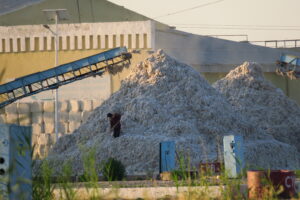
However, the farmers who refused to be employed by the company received have no compensation for the termination of their land lease agreements. Those who did agree to employment with the company subsequently either lost their jobs or experienced a significant decrease in income. Indorama has already laid off hundreds of workers, a situation that may affect over 13,000 workers. There have been regular reports of Indorama failing to uphold labour rights. This includes refusing to honour contracts, pay wages and bonuses, misclassifying permanent workers as service providers, and depriving them of employment benefits.
Civil society and affected local communities have raised numerous concerns related to the project and the client. There have been ongoing accounts of retaliation and obstacles to the establishment and operation of the first independent trade union in Uzbekistan. Additionally, Indorama has failed to implement the EBRD’s conditional Environmental and Social Action Plan in a timely manner and to ensure meaningful consultations. Yet, Indorama continues to receive loans from other banks, including the ADB, which recently awarded the company USD 15 million for the purposes of Covid-19 recovery and climate change mitigation.
Budapest Airport expansion, Hungary: residents’ fundamental rights at stake
The Budapest Ferenc Liszt International Airport is located 16 kilometres from the centre of Budapest. With a license for a capacity of 6 million passengers per year, peaking at 15 million in 2019, new plans to expand the airport, financed by the EIB, aim to increase passenger turnover to 21 million – more than twice the population of Hungary.

The quality of life of local inhabitants has been decreasing proportionally with the increase in air traffic. Noise and air pollution from burning kerosene (the fuel used in airplanes) is affecting a wide geographic area. Despite the anticipations of increased air traffic, the project has not been subject to an Environmental Impact Assessment as would be expected under the EU’s environmental legislation. This was made possible because the promoter divided the project into a series of smaller projects (a practice called ‘salami slicing’) and ignored their cumulative impacts. In addition to the construction at the airport itself, the project has also planned for a new cargo facility, a rail connection with a new railway station, and a range of projects aimed at ensuring a continued high-level service for travellers. In 2021, the EIB Complaints Mechanism confirmed all allegations against the project and recommended that a cumulative environmental impact assessment be carried out. However, to date, these recommendations have not been implemented and none of the breaches identified have been corrected or remedied.
Akiira geothermal energy project, Kenya: the dark side of EU development funds
The EIB has a long history of financing geothermal power plants in Kenya. In 2019, it was considering providing financing of EUR 155 million for the Akiira 1 geothermal plant, located near an informal settlement in post-colonial Kedong Ranch. Previously, the livelihoods of residents depended on charcoal burning. Tragically, in November 2019, the settlement was burned to the ground, with residents forcibly displaced by the police. This resulted in a humanitarian crisis, requiring the intervention of the Red Cross to provide aid to inhabitants, especially children, who had been left without food or shelter.
The EIB immediately halted its consideration of the loan for the Akiira project, removing it from its project pipeline. However, it soon turned out that the 70 MW geothermal energy project had received European public money through the Global Energy Efficiency and Renewable Energy Fund, a joint fund-of-funds initiative of the EIB and the European Commission, where the EIB has dual roles as advisor and investor.
Following a complaint from an evicted person, the EIB’s Complaints Mechanism acknowledged that the EIB Group had not adequately monitored the eviction process to ensure compliance with the Bank’s standards, and had thus failed to identify this act of non-compliance in a timely manner. Eventually, a social expert was hired to conduct an in-depth investigation. As a result, a corrective action plan is currently being implemented.
Mombasa Port Access Road, Kenya: a highway of destruction
The narrow, crowded road from Mombasa to Nairobi is the main traffic artery of eastern Africa. Kenya’s National Highways Authority (KeNHA) is working to expand a 41.7-kilometre section of the route to a dual carriageway standard. The EIB is supporting the project with a EUR 50 million loan. In 2015, more than a hundred families from the Jomvu area were forcibly evicted from their homes on the roadside to make way for the construction works. Only thanks to the adamant efforts of the affected community to seek help and the outreach work of civil society groups did the banks together with KeNHA halt the works to mitigate the harm and revise the Resettlement Action Plan for the whole project.
However, the mitigation process was far from satisfactory, and ultimately the EIB Complaints Mechanism facilitated a mediation process covering complaints from 316 people. In 2017, the community leaders reported intimidation by the project grievance mechanism established by the promoter. Despite the revision of the resettlement scheme for the project, between 2017 and 2019 the complaints mechanism received another 250 complaints in relation to the implementation of the revised plan. To date, the EIB Complaints Mechanism is still monitoring the implementation of the agreed corrective actions and recommendations.
Never miss an update
We expose the risks of international public finance and bring critical updates from the ground – straight to your inbox.
Institution: EBRD | EIB | ADB
Theme: development | Finance in Common | human rights
Project: The Khada Valley, Georgia
Tags: ADB | EBRD | EIB | development finance | human rights
